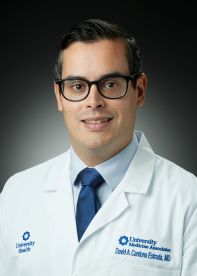Diagnosing Heart and Vascular Conditions
When you have a heart condition, you need treatment options you can count on. Our heart program includes skilled cardiologists, cardiothoracic and vascular surgeons in San Antonio who treat patients with a range of cardiovascular conditions.
Our care begins with an accurate diagnosis of your condition and continues through your cardiac rehabilitation.
Leading-Edge Diagnostic Equipment and Highly Trained Technicians
We perform hundreds of leading-edge heart and vascular procedures each year. Before our surgeons begin any kind of treatment, we rely on advanced testing and technologies to diagnose your condition.
Advanced Diagnostic Center
The Advanced Diagnostic Center gives our patients access to many medical specialties in one place. Specialists in heart, vascular, lung, gastrointestinal and interventional neurology work together to meet your needs. When other hospitals aren’t equipped to handle complex cases, they send them to us.
Non-Invasive Testing
Medication-Induced Stress Test
If you can’t exercise on a treadmill, we offer another option—a pharmacological nuclear stress test. During this test, we will give you a medication through an IV that dilates your blood vessels to mimic the effect of exercise. The IV also injects a dye that allows a scanner to capture images of blood flow through your heart.
The images reveal the parts of the heart that are not receiving enough blood. This test helps your doctor find irregular heart rhythms and areas of the heart that don't get enough blood and oxygen. It also shows how fast your heart recovers after exercise.
Artery Testing
We conduct arterial tests on the upper and lower extremities to diagnose peripheral arterial disease. The series of tests typically includes one or more of the following:
- Ankle-brachial index tests
- Color doppler ultrasound
- Computerized tomography (CT) angiogram
- Magnetic resonance angiogram
- Pulse and blood pressure checks
Short and Long-Term Heart Monitor
We use this technique, also called ambulatory monitoring, to record your heart’s activity for a period of time to detect changes in its rhythm. We can monitor your heart for 24-48 hours or for 30 days.
Sticky patches called electrodes are placed on your chest and connected to a portable monitor you wear during all your regular daily activities (eating, sleeping, working, etc.). The monitor detects an arrhythmia—when your heart beats too quickly, too slowly, or irregularly—and whether treatments are working. You will keep a log of your activities while wearing the monitor.
Light-Beam Imaging of the Coronary Arteries
Optical coherence tomography (OCT) is new imaging technology that uses light instead of sound to capture images from inside the coronary artery. These high-resolution 3D images give your doctor a clear picture of your arteries to identify areas of plaque buildup or blockage.
Testing for Thickened Heart Muscle
Hypertrophic cardiomyopathy (HCM) detects this inherited heart disease. HCM can cause the wall of the heart muscle to thicken, obstructing blood flow from the heart. This genetic heart disease can cause sudden cardiac death in young people and heart failure in people of any age.
Invasive Testing
Angiograms
Coronary angiogram (diagnostic cardiac catheterization)
We will insert a short, hollow tube into a blood vessel in your arm or leg. Then, we will insert a catheter into the tube that releases dye into your heart. The dye appears on X-ray and other tests. This allows your cardiologist to evaluate your heart function.
The procedure confirms coronary artery disease, assesses how your heart functions, and identifies what treatments you may need. It can be used for diagnostic and interventional purposes.
Peripheral angiogram
Your cardiologist uses X-rays to find narrowed or blocked areas in one or more of your arteries. A catheter placed into the arteries delivers a dye into the bloodstream, visible by X-ray. Narrowed or blocked arteries appear on a video screen.
Heart Biopsy
Your doctor will take small pieces of tissue from the heart to diagnose your condition. Heart biopsies can determine if a virus caused inflammation of the heart or to check for signs of a heart transplant rejection.
Electrophysiology Testing
Studies of the Heart's Electrical Activity
Electrophysiology (EP) studies record your heart’s electrical activity. We conduct tests if you are experiencing:
- Heart rhythms that are too slow (bradycardia)
- Heart rhythms that are too fast (tachycardia)
- Irregular heart rhythms
- Feelings of dizziness or fainting
- Symptoms that may show the need for a pacemaker or an ablation procedure
3D Mapping of the Heart
3D mapping makes a map of the entire heart. Your doctor can search for the origin of the abnormality causing the abnormal heart rhythm and treat it. We use state-of-the-art 3D mapping in addition to standard X-rays.

Heart disease is the leading cause of death for both men and women.
Take our quick Heart Health Risk Assessment to understand your risk of heart disease and how to lower it



